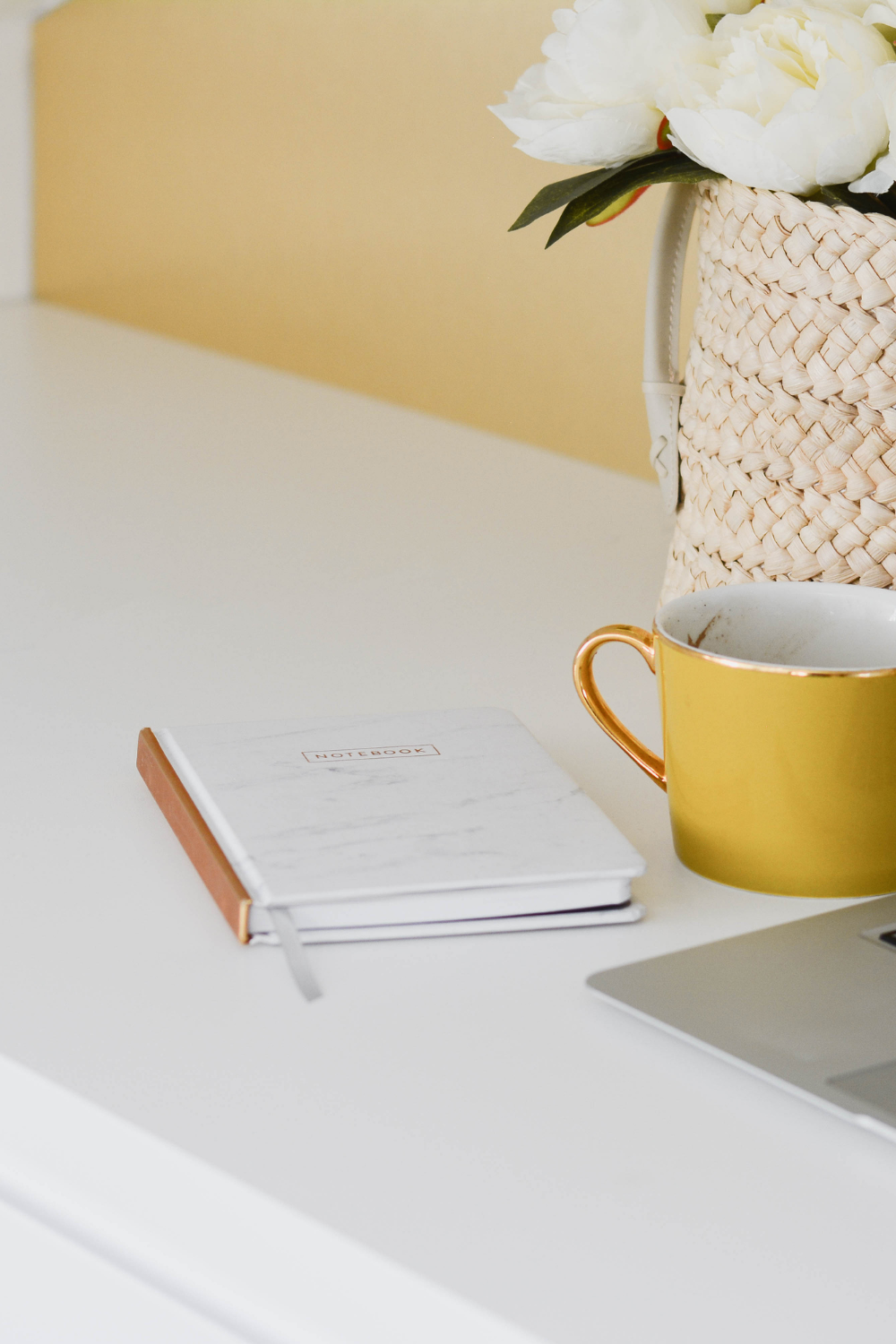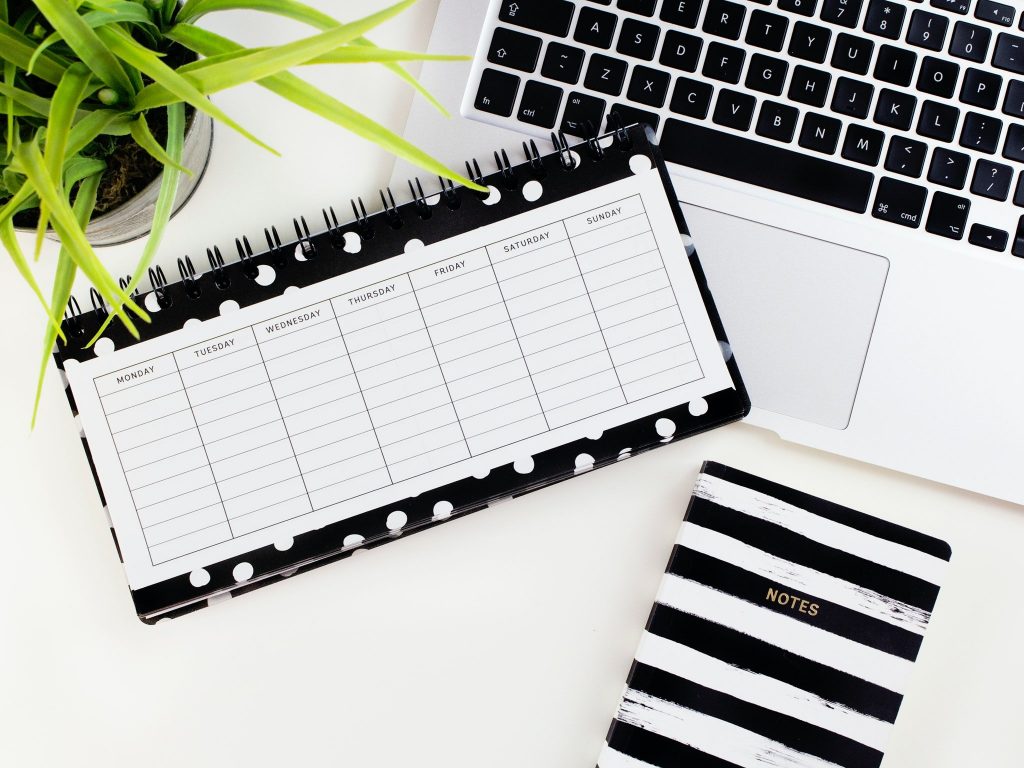This post may contain affiliate links, which means I’ll receive a commission if you purchase through my links, at no extra cost to you. Please read my full disclosure for more information.

Working from home for many can seem like a big dream come true. You might think to yourself “All that time!” “All that freedom!”
Although there is some truth in those statements, it takes hard work, good habits, and great self-discipline to turn your work from home into this productive dream-like idea you’ve initially envisioned.
Whether you are a parent, student, blogger, or working from home due to extraordinary circumstances, I have 10 effective work from home tips that can both ensure maximum productivity and help you navigate the work from home life (whether you are new to this lifestyle or not!)
1. Plan your week in advance
My first tip would be to plan your week in advance. This initiative establishes the most important tasks you need to get done throughout the week.
It can also help prevent you from procrastinating or missing out on time for the items you should be prioritizing.
I personally take every Sunday evening to plan ahead for my entire week. It allows me enough time to reflect on the past and upcoming weeks, and helps keep me on track as I start the next week on the right foot.

2. Have a set schedule
Another work from home tip involves having a set schedule. This can be further facilitated when you take the step of planning your week in advance.
Having a set time schedule gives your days structure and holds you accountable.
I believe that if you don’t set a schedule for yourself, you might find yourself scrambling at many odd hours of the day to get work done. And hence, you will always be behind and overestimate how long your various tasks might take you.

That’s why it’s good to have a set schedule. Think of it as clocking in and clocking out.
Plus, having a set schedule ‘timetable’ will promote not only consistent working hours but also consistent resting and sleeping hours.
In order to help you follow your schedule, have hourly check-ins to see how focus you are at different times of the day. By having these check-ins, you see how long certain tasks take you to complete. Then, you can tweak and adjust your schedule as needed.
3. Have reasonable daily goals
There is a tendency – even if you planned your week ahead and have a set schedule – to believe that you can do it all in a day. If this hits close to home for you, I would recommend setting more reasonable daily goals.
Instead of having 20 items on your to-do list for Monday, try to always have 3-5 things that are on your daily priority list. Those first items should be crossed off by the end of your scheduled work time, and if you get to the rest, great. If not, there is always tomorrow!
4. Get a planner (or an agenda)

I would suggest getting a planner to ensure you can plan for your week, set a timetable for yourself, and list your daily priority goals. Personally, I am a very visual person. Therefore, I need to see all of my plans laid out before my eyes and consult these plans as I go through my day(s) and my week(s.)
If you have an aversion to paper, you can opt for a digital calendar or planner. There are a lot of digital apps online FREE to use. Even smart phones come with reminders, calendars, and to-do lists in which you can use as a planner.
Here are some of the best planners:
5. Start your days earlier
When working from home, I would recommend trying to start your days earlier. I don’t necessarily suggest starting ‘work’ as soon as you get up. I mostly mean having that hour in the morning to decompress and start the day right. Opposed to starting your day stressed, scrambling or being/feeling sluggish to get a start on.
Working from home cuts commute time, traffic time, and all kinds of inconvenience that would once contribute to the daily stressors of a work day. Working form home gives us a chance to use that time to further centre ourselves and start the day with optimism.
The morning hours can be the most quiet hours depending on your living situation. It could be either the perfect time to start on work or to have me-time to read, do some Yoga, shower, etc., before easing into work.
Plus, many people are more focused in the morning hours. Hence, getting the heavy lifting work done in the morning as steam – motivation and focus – is gradually lost throughout the day.

6. Get out of your pyjamas
Another a work from home tip would be to get out of your pyjamas. This helps you feel refreshed. It also gives you a mental distinction between your work day and your night time. You give your brain the wrong signals if you work in the same clothes you go to bed with (same goes with working in your bed when you have the option of working at a table.)
This does not mean that you need to necessarily “dress up” as you would if you went to the office (unless you have Zoom meetings and the likes.) But it does mean to at least swap your nightwear for comfortable clothes to work in at home.
7. Turn off distractions
This tip seems evident but it really isn’t… One you start convincing yourself that you do not need to “turn off distractions,” you start to thread a dangerous territory – like not changing out of pyjamas but worse. This territory in which there is no clear distinction between working from home and being at home.
Set away from your personal phone and accounts until your work day is over – or until your work ‘hours’ are over – or until you reach your lunch hour. We really need to be more disciplined in this practice when we work from home!

If you wouldn’t be on your phone while someone is presenting in a meeting or when you are serving customers, then why should you be consulting your phone during your at-home work hours?
Social media and texting is a big, big time suck. It’s important to be and stay connected when you are isolated at home. However, setting intentional time for connectivity is much more valuable in building your connections with others. As you can give them your full attention after giving work your full attention.
All of this to say that you are better off calling your friend(s) or relative(s) at the end of your work day than sending memes and texts back and forward all day. And then wondering why your always behind on work. Trust me, we’ve all been there.
Another distraction I would recommend turning off during your work hours involves background noises. I don’t mean music – some people concentrate well with music (I am one of these people!) I mean turning off the TV, the YouTube videos, or the radio while you are working.
You think you’re being productive by combining work with play but in actuality, you are muddling your brain and making things infinitely harder. At the end of the day, you’ll be much more drained then if you just set time aside to watch a show or those YouTube videos at the end of your work day.
8. Set boundaries
Essentially, you simply need to set boundaries. The previous tips involved you respecting your personal time and your work time. However, setting boundaries needs to also extend beyond you towards family and friends. Others might invalidate your work and your work hours because you are working from home or working for yourself (as in, you are your own boss).
But the truth is, they need to respect your time. It is your job to let them know of your boundaries and for you to maintain them as best as you can. (This doesn’t mean avoiding emergencies!)
Another important boundary you need to set is finishing your work on time. As in, don’t aways go over-time or try to consistently get more done.
I know the feeling, especially with starting an online business, the lines became increasingly blurred. I felt like all hours of the day is a ‘work hour.’ I didn’t set the correct boundaries and consequently neglected my health and overall well-being as I never got to rest or have a work-life and personal-life separation.
So make boundaries and generally stick with them! Know your limits! If not, you will cross over them and feel burned out and not get the work done as productively as you imagined to.
9. Designated work station(s)
My ninth tip would be to have a designated work station at home to help you work from home. If you have more space in your home, I would also recommend to allocate different spaces for different tasks or even for different times of the day.
For example; I’ll write at my desk in my room, but I’ll do research at the dinning room table. And throughout the day I chase the sun in these designated areas.

Sometimes changing up your work space gives the signal to your brain that you are ready to tackle the next big task.
Other tips for maximizing your work space involves making sure that you have enough space. If you feel too crowded, you might not be able to focus. Consequently, try to keep your work space(s) clear since physical clutter can be a distraction and can cause mental clutter.
And finally, if you can, try to be close to an open window and get some natural light in. If you always work in the dark or in the shade, you won’t have that work day and evening time distinction!
10. Get some fresh air
My final tip would be to try to get some fresh air. This could be running an errand, going for a short walk around the block, or even standing out on your porch for a couple of minutes.
This will do your brain some good as it will refresh you and give you fresh oxygen. I find there is a big difference between cracking a window and actually going outside.

We are human, not working machines. Therefore, we are not meant to spend every second of the day cooped up inside!
And you can use this ‘going outside’ time to stretch and get active, increase your heart rate after spending the whole day seated! As well as activate your feel good hormones!
I hope you enjoyed these 10 work from home tips for maximum productivity. Please let me know which tips have been invaluable for your work from home routine. 🏠
Like this post? Save Pin for later!








Leave a Reply